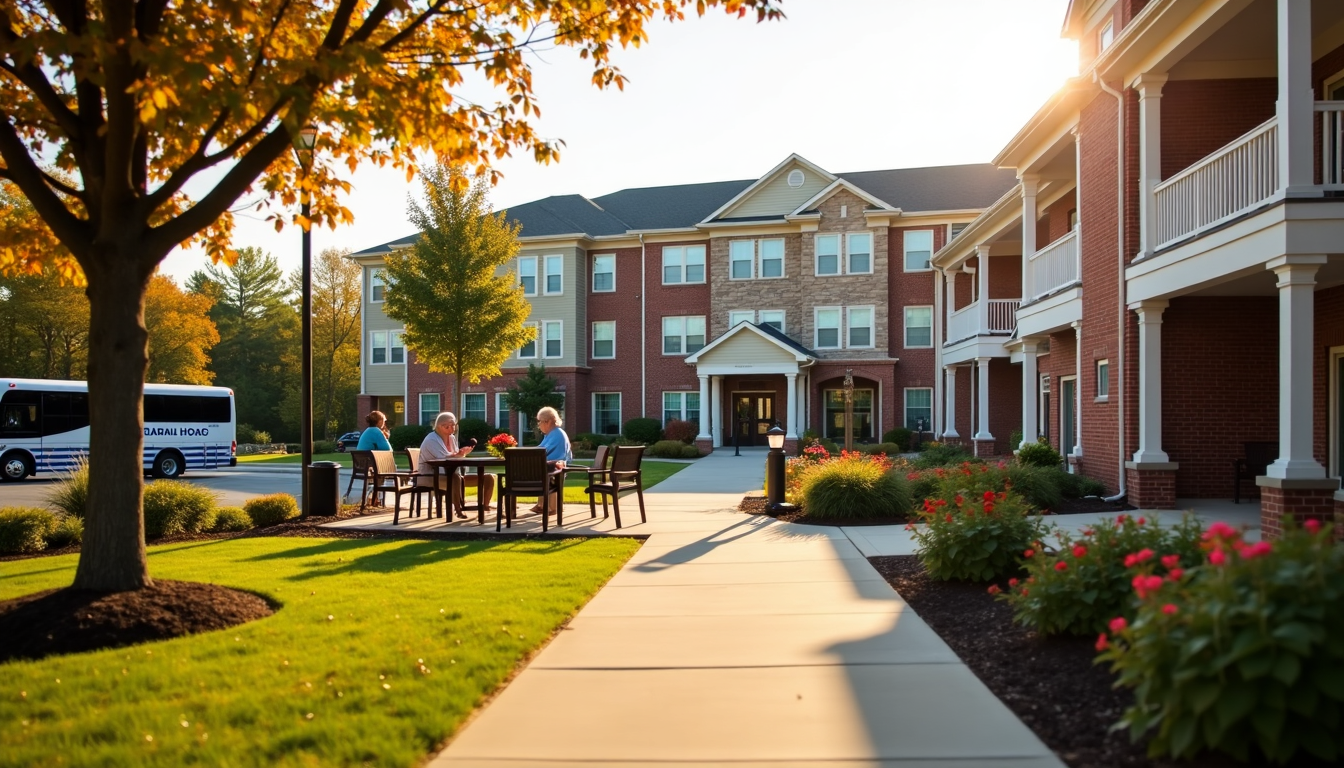Wisconsin’s seniors face the most important challenges when it comes to managing healthcare costs, housing expenses, and daily living needs. Wisconsin senior assistance programs give vital support services and financial aid to help older adults stay independent and maintain their quality of life. These programs are a vital resource to help the state’s growing elderly population, especially when you have limited income and resources.
The state provides many support options through agencies and organizations of all sizes. These include Medicare, Medicaid, and prescription drug assistance programs. Seniors who qualify can get financial aid, housing support, transportation services, and specialized care programs. This complete guide helps seniors and their families understand program eligibility requirements, application processes, and available resources through Wisconsin’s aging and disability resource centers. This knowledge helps them make better decisions about their assistance options.
Overview of Wisconsin Senior Assistance Programs
Wisconsin offers a complete network of assistance programs that help seniors deal with life’s challenges. These programs work through different channels and provide support services. Senior residents can maintain their independence and quality of life with this help.
Types of assistance available
Wisconsin helps senior citizens through several key support programs:
- Health and Medical Support: You can access Medicaid programs, SeniorCare prescription assistance, and specialized care services through PACE (Program of All-Inclusive Care for the Elderly)
- Long-term Care Services: The state provides support through Family Care and IRIS (Include, Respect, I Self-Direct) programs
- Financial Assistance: Senior citizens can get energy assistance, housing support, and supplemental security income
- Community-Based Services: Seniors have access to adult day care, transportation assistance, and meal programs
- Protective Services: The state runs programs that protect elderly residents from abuse, neglect, and exploitation
Key state agencies involved
The Wisconsin Department of Health Services leads senior assistance programs and partners with several important organizations. Aging and Disability Resource Centers (ADRCs) serve as the first stop for seniors who need help. These centers offer free consultations in 70 Wisconsin counties and connect seniors with suitable programs and benefits.
The Greater Wisconsin Agency on Aging Resources delivers technical support and training to maintain high program standards statewide. The Wisconsin Office of the Commissioner of Insurance helps seniors understand their options for health, disability, and life insurance coverage.
General eligibility criteria
Most Wisconsin senior assistance programs share common eligibility factors, though specific requirements differ between programs.
| Requirement Category | Typical Criteria |
|---|---|
| Age | 65 years or older |
| Residency | Wisconsin resident |
| Citizenship | U.S. citizen or qualifying immigrant status |
| Income Level | Varies by program, often based on federal poverty guidelines |
| Asset Limits | Generally $2,000 for individuals, $3,000 for couples |
Wisconsin’s ADRCs provide detailed assessments to determine program eligibility. They look at key factors like functional needs, income levels, and available resources. A Long-Term Care Functional Screen helps them review seniors’ needs and match them with suitable assistance programs.
Health and Wellness Programs
Wisconsin’s aging population faces critical healthcare access challenges. The state actively supports seniors through comprehensive health and wellness programs that provide medical care and nutritional assistance.
Medicare and Medicaid
Wisconsin provides complete healthcare coverage through Medicare and Medicaid programs. Medicare works as the federal health insurance program if you are 65 and older. Medicaid gives extra coverage to people with limited income and resources. The state’s Elderly, Blind, or Disabled (EBD) Medicaid program helps seniors who meet specific income and asset requirements.
Key Coverage Comparison:
| Program Type | Primary Benefits | Additional Features |
|---|---|---|
| Standard Medicare | Hospital, medical care, preventive services | Limited coverage for skilled nursing |
| EBD Medicaid | Long-term care, personal care, housekeeping | Covers services Medicare doesn’t |
SeniorCare Prescription Drug Assistance Program
Wisconsin residents aged 65 and older can access affordable prescription drugs through the SeniorCare program. The state pharmaceutical assistance program features four coverage levels that depend on your annual income:
- Level 1: Immediate coverage with minimal copayments
- Level 2a and 2b: Annual deductible before copayments begin
- Level 3: Higher deductible with spenddown requirements
Each person needs to pay a $30 annual enrollment fee to join the program. SeniorCare qualifies as creditable coverage and meets Medicare Part D standards. Members can combine SeniorCare benefits with their current prescription drug coverage to save more money.
Elderly Nutrition Program
Wisconsin’s Elderly Nutrition Program runs according to federal Older Americans Act guidelines. The program helps reduce hunger and brings seniors together. Here’s what it provides:
Congregate Dining Services:
- 28 senior dining locations across Dane County
- Nutritious meals that cover 1/3 of daily recommended allowances
- Social activities and health education programs
- Transportation assistance to dining sites
Home-Delivered Meals: Homebound seniors can get their meals through Meals on Wheels services with hot and frozen options available. Registered dietitians create meals that meet strict nutritional guidelines to keep aging adults healthy.
Seniors who face specific dietary challenges can work with registered dietitians to get customized nutrition advice. These experts help manage health conditions ranging from diabetes to swallowing difficulties.
Seniors can also benefit from the Senior Farmers’ Market Nutrition Program. This program gives eligible seniors $45 worth of vouchers to buy Wisconsin-grown produce at farmers’ markets and roadside stands. Local farmers get support while seniors get access to fresh, healthy foods.
Financial and Housing Assistance
Financial support programs in Wisconsin help seniors manage their household expenses and housing costs. Wisconsin’s government runs several programs that keep elderly residents financially stable and ensure they live safely in their homes.
Social Security and Supplemental Security Income
Wisconsin seniors can access two different programs through the Social Security Administration. Social Security retirement benefits become accessible when you have earned at least 40 credits through your lifetime employment. Your previous earnings and work history determine these benefits.
Supplemental Security Income (SSI) helps seniors who have limited resources. Wisconsin residents who qualify receive automatic supplements to their federal SSI payments. You must meet these eligibility requirements:
- Assets limited to $2,000 if you have one person or $3,000 for couples
- U.S. citizenship or qualifying resident status
- Wisconsin residency
- Age 65 or older, blind, or disabled
Energy Assistance Program
The Wisconsin Home Energy Assistance Program (WHEAP) helps seniors pay their utility bills. This program runs from October 1 to May 15 and provides one-time payments to help with heating costs. Payment amounts depend on household size and income:
| Household Size | Monthly Income Limit | Annual Income Limit |
|---|---|---|
| 1 person | $3,061.08 | $36,733 |
| 2 people | $4,002.92 | $48,035 |
| 3 people | $4,944.83 | $59,338 |
WHEAP supports seniors with both standard heating assistance and emergency crisis support. The program helps with:
- Regular heating expenses
- Monthly electric bills
- Emergency utility situations
- Immediate help during energy crises
- Budget planning support
Home repair and modification grants
Wisconsin helps seniors keep their homes safe and accessible through several programs. The Section 504 Home Repair program gives you two ways to get help:
- Home Repair Loans:
- Maximum loan amount: $40,000
- Fixed 1% interest rate
- 20-year repayment term
- You must meet very-low-income requirements
- Home Repair Grants:
- Maximum grant amount: $10,000
- Available to seniors 62 and older
- You must use it to fix health and safety hazards
- Keep the property for 3 years and no repayment needed
The Family Care Waiver Program helps elderly residents with physical limitations modify their homes. On top of that, the Wisconsin Assistive Technology Program (WisTech) gives you resources to make your home more accessible.
The state’s HOME Investment Partnerships Program helps low-income homeowners with needed improvements and accessibility changes. You can get up to $4,000 through the Alzheimer’s Family and Caregiver Support Program to modify homes that care for people with Alzheimer’s disease.
Local Rural Development offices and Area Agencies on Aging take applications throughout the year. You’ll need to show financial need and prove you live in the home to qualify for most housing programs.
Application Process and Required Documentation
Seniors need proper documents to apply for Wisconsin’s senior assistance programs. The program’s application process demands attention to detail. Knowledge of application methods and requirements helps seniors enroll smoothly.
How to apply for different programs
Wisconsin seniors can access assistance programs through multiple channels that match their individual priorities:
Online Application Process: Seniors can use the ACCESS Wisconsin portal (access.wi.gov) as their main online platform to apply for benefits. The system lets users:
- Submit applications for multiple programs at once
- Upload verification documents
- Track application status
- Handle existing benefits
Traditional Application Methods:
| Method | Key Features | Processing Time |
|---|---|---|
| Phone | Support through consortium call centers | 30-45 days |
| Mail-in | Signed and dated forms required | 45-90 days |
| In-person | Local county offices available | 30-45 days |
Common application requirements
Eligibility for assistance programs depends on a thorough verification process. Applicants need these documents from several categories:
Identity and Citizenship:
- Social Security card
- Medicare card (if applicable)
- U.S. citizenship documentation or qualifying immigrant status
- Wisconsin state ID or driver’s license
Financial Documentation:
- Bank statements (previous months)
- Income verification
- Life insurance policies
- Property deeds
- Pre-need burial contracts
- Investment account statements
Medical Documentation:
- Current health insurance cards
- Medical bills from previous three months (if seeking retroactive coverage)
- Documentation of any disability claims
Where to get application assistance
Wisconsin offers a comprehensive support network that helps seniors through their application process:
Professional Assistance Sources:
- Aging and Disability Resource Centers (ADRCs)
- Local senior centers
- County aging offices
- SeniorCare Customer Service (800-657-2038)
Authorized Representatives: Seniors can choose someone to help with their application by:
- Filling out form F-10126A for individual representatives
- Submitting form F-10126B for organizational representatives
- Getting proper documentation for legal guardians or power of attorney
Application Processing Timeline: Each program has different processing times:
- Regular applications take 30-45 days
- Disability-related applications need up to 90 days
- SeniorCare applications start processing after you pay the enrollment fee
Missing information or documents will slow down your application. The Wisconsin Department of Health Services suggests collecting all required documents before you start. Local agencies can help if you struggle to get the needed documentation.
Need help with a specific program?
- Medicaid Questions: Reach out to your local income maintenance consortium
- SeniorCare Questions: Call the dedicated customer service line
- Medicare Assistance: Get in touch with Wisconsin SHIP (State Health Insurance Assistance Program)
The core team at local agencies can explain requirements, help fill out forms, and solve application problems. This support becomes essential when you deal with complex cases or need help with multiple program applications.
Conclusion
Wisconsin’s senior assistance programs offer a strong support system that helps older adults across the state. These detailed programs provide everything in healthcare, housing, and financial support to help seniors live independently with dignity as they retire. State agencies collaborate through connected networks to ensure seniors get the support they need based on their situation.
Local Aging and Disability Resource Centers serve as trusted partners when seniors want to learn about assistance options. These centers help navigate application processes and handle paperwork requirements. They make complex systems easier for elderly residents and their families to understand. Seniors who use these resources often find many more benefits and services that improve their life quality and reduce money worries.
FAQs
Who qualifies for SeniorCare in Wisconsin?
To be eligible for SeniorCare in Wisconsin, individuals must be residents of the state, U.S. citizens or qualifying immigrants, and aged 65 or older.
What types of assistance programs does Wisconsin offer?
Wisconsin provides several assistance programs for low-income households, including FoodShare for food assistance (also known as SNAP or food stamps), BadgerCare Plus and Wisconsin Medicaid for healthcare, and Wisconsin Shares for child care expenses.
Can you explain what the Senior Alliance Program in Wisconsin is?
The Senior Alliance Program in Wisconsin aims to create a supportive community for older adults and adults with disabilities, along with their families and caregivers, fostering a network of support and resources.




